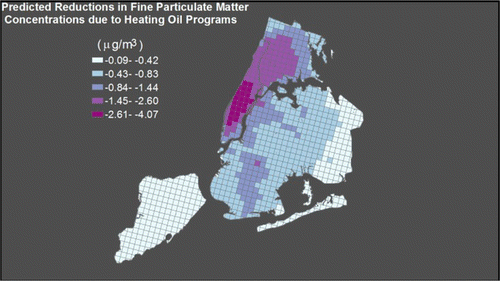As winter approaches, switching to cleaner heating oils could prevent health problems

With temperatures dipping, homeowners are firing up their heaters. But systems that require heating oil release fine particles outside that could have harmful health effects. Regulations to curb these emissions in New York City, however, could save hundreds of lives, a new study has found. The report in the ACS journal Environmental Science & Technology may have ramifications for the entire northeast, the country's largest consumer of heating oil.
Iyad Kheirbek and colleagues note that when some people breathe in fine particulate matter from the air, they suffer from increased airway inflammation, reduced lung function and changes in heart rhythm and blood pressure. In New York City alone, this type of air pollution has been linked to more than 2,000 premature deaths, close to 5,000 emergency room visits for asthma and 1,500 hospitalizations for respiratory and cardiovascular disease each year. To address the problem, the city and New York state have put in place a multi-year plan to dramatically lower fine particulate matter from heating oil emissions by mandating a switch to cleaner oils. Other northeast states are set to follow suit. Kheirbek's team wanted to see what effects the new regulations might have.
The researchers used a computer model to analyze partial and complete phase-outs of various heating oils. They estimated that in New York City, a complete phase-out could prevent about 290 premature deaths, 180 hospital admissions for respiratory and cardiovascular disease and 550 emergency room visits for asthma each year. They also found that emissions reductions could benefit residents of high-poverty neighborhoods the most.
More information: "The Public Health Benefits of Reducing Fine Particulate Matter through Conversion to Cleaner Heating Fuels in New York City" Environ. Sci. Technol., Article ASAP. DOI: 10.1021/es503587p
Abstract
In recent years, both New York State and City issued regulations to reduce emissions from burning heating oil. To assess the benefits of these programs in New York City, where the density of emissions and vulnerable populations vary greatly, we simulated the air quality benefits of scenarios reflecting no action, partial, and complete phase-out of high-sulfur heating fuels using the Community MultiScale Air Quality (CMAQ) model conducted at a high spatial resolution (1 km). We evaluated the premature mortality and morbidity benefits of the scenarios within 42 city neighborhoods and computed benefits by neighborhood poverty status. The complete phase-out scenario reduces annual average fine particulate matter (PM2.5) by an estimated 0.71 μg/m3 city-wide (average of 1 km estimates, 10–90th percentile: 0.1–1.6 μg/m3), avoiding an estimated 290 premature deaths, 180 hospital admissions for respiratory and cardiovascular disease, and 550 emergency department visits for asthma each year. The largest improvements were seen in areas of highest building and population density and the majority of benefits have occurred through the partial phase out of high-sulfur heating fuel already achieved. While emissions reductions were greatest in low-poverty neighborhoods, health benefits are estimated to be greatest in high-poverty neighborhoods due to higher baseline morbidity and mortality rates.
Journal information: Environmental Science & Technology
Provided by American Chemical Society
















